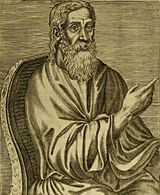Thanks to the online Christian Classics Ethereal Library, we can read Chapter 10, "Steps to Perfection" from Book 7 of St. Clement's The Stromata, or Miscellanies (the trained Christian ear already strains at cult-like sound of this bizarre title, and a spiritually sensitive reader will naturally recoil at the chapter title with its eerie Mormonesque overtones). Only four paragraphs into Chapter 10, we find this alarming, soul-numbing passage that should forever strip the saintly mask off this cultish masquerader:
And this takes place, whenever one hangs on the Lord by faith, by knowledge, by love, and ascends along with Him to where the God and guard of our faith and love is. Whence at last (on account of the necessity for very great preparation and previous training in order both to hear what is said, and for the composure of life, and for advancing intelligently to a point beyond the righteousness of the law) it is that knowledge is committed to those fit and selected for it. It leads us to the endless and perfect end, teaching us beforehand the future life that we shall lead, according to God, and with gods; after we are freed from all punishment and penalty which we undergo, in consequence of our sins, for salutary discipline. After which redemption the reward and the honours are assigned to those who have become perfect; when they have got done with purification, and ceased from all service, though it be holy service, and among saints. Then become pure in heart, and near to the Lord, there awaits them restoration to everlasting contemplation; and they are called by the appellation of gods, being destined to sit on thrones with the other gods that have been first put in their places by the Saviour.
Perfection? Reaching a state in which humans are called "gods" and sit on thrones with other "gods"? Most troubling. Some of you still call this man a Saint? Hmm, maybe a "Latter-day Saint," but don't tell me this is compatible with historic Christianity (here I define "historic Christianity" as Christianity since, oh, about 1500 A.D.) With doctrines shockingly similar to theosis, it's pretty clear he's not saint at all, but some kind cultist, or even worse, some kind of proto-Mormon.
The gaffe quoted above was not a freak momentary lapse in his life. In another work, he again reveals his frightening proto-Mormon delusions in this passage which you can read in his "Exhortations to the Heathen" (Protrepticus 1.8.4), available at EarlyChristianWritings.com or also at the Christian Classics Ethereal Library:
But if thou dost not believe the prophets, . . . the Lord Himself shall speak to thee, "who, being in the form of God, thought it not robbery to be equal with God, but humbled Himself" . . . yea, I say, the Word of God became man, that thou mayest learn from man how man may become God. Is it not then monstrous, my friends, that while God is ceaselessly exhorting us to virtue, we should spurn His kindness and reject salvation?
Monstrous indeed, as in monstrous Mormonism. Time to set the record straight at last! Unfortunately, this is not the only early so-called "Christian" leader with such problems. I expose even more on my LDSFAQ page on theosis. We've got to get the word out and help our fellow Christians see who some of these early "fathers" really were. The fact that they were venerated for centuries by Christians and seemed sincere in their belief in Christ and defense of Christian faith in no way qualifies them as authentic Christians according to our more rigorous recent definitions of "Christian" as required by modern historic Christianity. With flawed proto-Mormon theology, we must reject their status as Christians and, frankly, recognize that these deluded men are surely roasting in hellfire now. Them's the breaks.
Continue reading at the original source →




